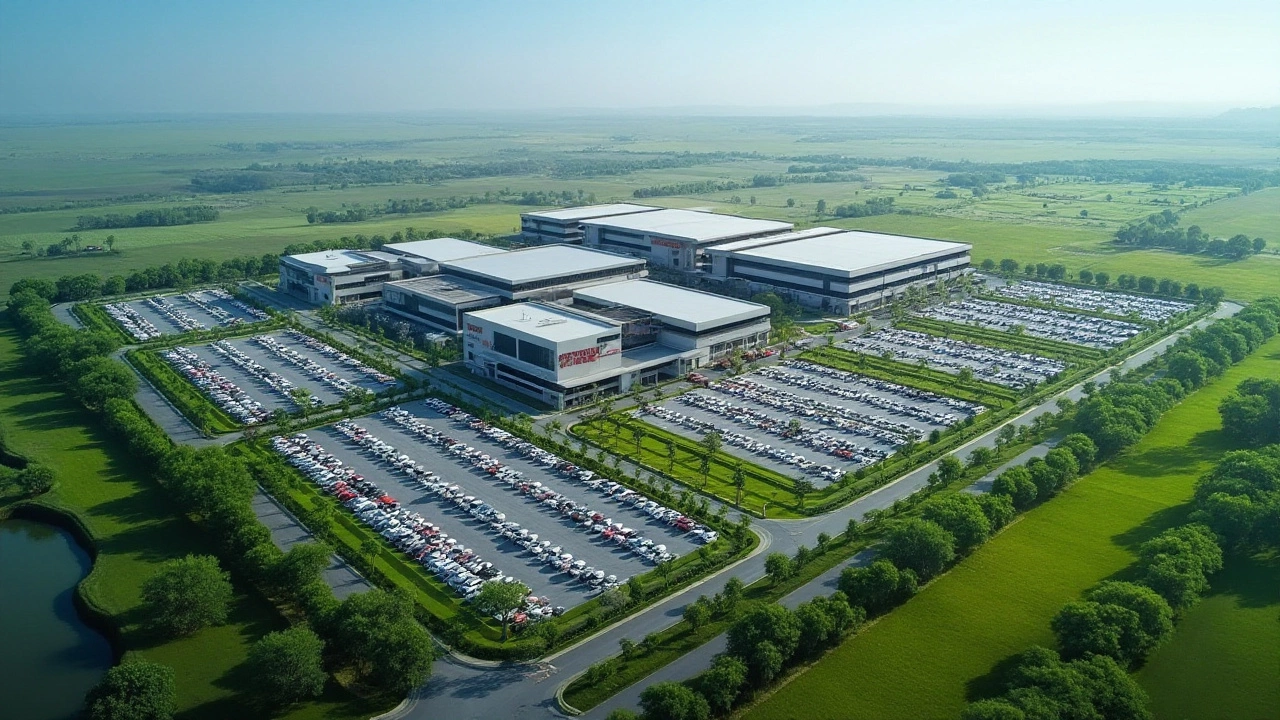Toyota's journey in India is a tale of strategic movements and thoughtful collaborations. As the Indian automobile market expands, Toyota has continuously adapted to meet the diverse needs of its customers. With local manufacturing plants spread across various regions, the company has not only managed to keep operations efficient but also fueled economic growth in these areas.
The heart of Toyota's Indian operations lies in its robust manufacturing plants. Each facility tells a story of precision, innovation, and dedication to quality. Whether it's the spacious facilities in Karnataka or the dynamic partnerships like Toyota Kirloskar, the focus is not just on assembling vehicles but crafting experiences with every car that rolls off the line.
- Toyota's entry into the Indian market
- Manufacturing plants and locations
- Key models produced in India
- Joint ventures and partnerships
- Sustainability and innovation
- Impact on the Indian economy
Toyota's Entry into the Indian Market
The story of Toyota India began in the late 1990s, when the Indian automotive market was ripe for investment, with the economy on a steady growth curve and a rising middle class eager for affordable, reliable cars. Toyota, known globally for its efficiency and innovation, recognized the potential in this burgeoning market and seized the opportunity by establishing Toyota Kirloskar Motor Private Limited, its joint venture with the Kirloskar Group in 1997. This move marked Toyota's serious commitment to a country where the demand for automobiles was gradually climbing, aligning perfectly with India's liberalization policies that welcomed foreign investments and collaborations.
With its first manufacturing plant set up on the outskirts of Bengaluru in 1999, Toyota dedicated a substantial amount of resources to ensure the facility was state-of-the-art. This plant was more than just a production hub; it was a statement of intent that Toyota was here to stay in the Indian market. The plant initially focused on producing the Qualis, a model tailored to the desires and needs of Indian consumers, marrying reliable engineering with the comfortable features needed for local conditions.
Over the years, Toyota's presence in India evolved as it introduced a range of models such as the Corolla and the Innova, capitalizing on its already earned reputation for durability and quality. The company invested heavily in understanding the local market, engaging in market research and establishing a supply chain that supports rural and urban operations alike. The strategic move to manufacture high-demand models domestically not only made the vehicles more accessible to Indian consumers but also significantly reduced costs and delivery times.
As the automotive market in India continues to expand, Toyota has adapted its strategies. In recent years, Toyota has placed a greater emphasis on hybrid and efficient vehicles like the Toyota Camry Hybrid, aligning its efforts with India's push towards more sustainable automotive solutions. This adaptation is evident in the company’s manufacturing process, where a commitment to reducing emissions and improving fuel efficiency has become a central target. Collaborations with government bodies and various green initiatives further highlight Toyota’s ongoing commitment to sustainability in all its operational facets.
Toyota's entry into the Indian market is not just framed by its business success. It also marked the beginning of a long-term relationship, deeply rooted in shared values and ambitions, with India as a pivotal player. The company's journey serves as a remarkable case study in strategic international expansion, highlighting the importance of understanding market dynamics and the power of agile adaptation in the face of evolving consumer preferences.
Manufacturing Plants and Locations
In the grand narrative of Toyota's expansive operations, India serves as a critical hub for its car manufacturing prowess. The roots of these operations can be traced back to Toyota Kirloskar Motor (TKM), a joint venture set up in the late 1990s. Situated in Bidadi, Karnataka, this landmark facility takes the notion of manufacturing to a whole new level. Embodying the spirit of precision and ingenuity, the plant is a bustling powerhouse of activity where the latest technology meets skilled craftsmanship. Complemented by a sprawling second plant within the same locality, Bidadi is the epicenter of Toyota's manufacturing ethos in India, where sustainability meets innovation.
Here, the plant operates on a vast scale with an initial investment that speaks volumes about Toyota's commitment. Not just in terms of money, but also in terms of strategic foresight and a keen understanding of the Indian market demands. The Bidadi plant covers every spectrum of automobile manufacturing, from assembly line techniques to sophisticated robotics—highlighting the nexus of human labor and automated processes. Though these plants focus on domestic supply, they are equipped to handle an increase in export potential, as Toyota India's reputation grows globally.
The Indian automobiles produced here are known for their robust build quality and excellent service life. These products have found favor not only within Indian borders but also in international markets. At the heart of these operations is Toyota's unwavering commitment to quality, known globally as the 'Toyota Way.' This commitment is embodied not just in the cars that roll out of Bidadi but in the meticulous planning, exhaustive testing, and the rigorous quality checks that each vehicle undergoes.
"Manufacturing is more than just process. It is creativity in motion," says Akito Tachibana, former Managing Director of Toyota Kirloskar Motor.
Expanding the frontiers of manufacturing, Toyota is continuously scaling its operations in India. This involves upgrading existing facilities, investing in new technologies, and working closely with their partners to ensure that innovation keeps pace with aspiration. The Toyota production facilities in India are a tipping point for the automobile giant, enabling it to cater to a burgeoning market while also leveraging a globally competitive production base. With an eye on sustainability and a heart tuned to innovation, these plants illustrate what is possible when engineering excellence meets local expertise, forging a path into the future of automobile manufacturing in India.

Key Models Produced in India
Toyota has long been a prominent player in the Indian automobile industry, showcasing a wide array of models that cater to varying preferences and needs. Among the most iconic is the Toyota Innova, a household name for its versatility and dependability. This multi-purpose vehicle strikes the perfect balance between comfort and performance, making it a favorite for both families and fleet operators. Produced in the heart of India, this model aligns well with the local demand for spacious interiors and robust engineering. The Innova's reputation for enduring quality has been well documented and is synonymous with Toyota’s commitment to excellence.
Another standout model that rolls off the Indian assembly lines is the Toyota Fortuner. Known for its strong road presence and rugged capabilities, the Fortuner is a sports utility vehicle that resonates well with India's love for adventure and journeys across diverse terrains. The sophisticated yet aggressive exterior design complements a plush interior that's loaded with features. For Toyota, constructing the Fortuner domestically enhances agility in production and helps keep pace with the ever-evolving preferences of SUV aficionados.
"Toyota's commitment to the Indian market is evident in their approach to local manufacturing, focusing not just on quantity, but on quality that meets global standards," said a representative from the Society of Indian Automobile Manufacturers.
The compact sedan segment is well-represented by the Toyota Yaris. It caters to those who appreciate the blend of smart design and economic efficiency. By producing it locally, Toyota ensures that the Yaris maintains an attractive price point while packing in an abundance of safety features, something the company prides itself on worldwide. The sedan delivers on comfort without compromising on environmental standards, displaying Toyota’s efforts to cater to eco-conscious consumers.
In response to the growing demand for eco-friendly vehicles, Toyota also explores hybrid technologies in the Indian context. The Toyota Camry hybrid is assembled with precision, reflecting Toyota's dedication to pioneering green mobility solutions. This model reflects a keen understanding of India's progressive stance on environmental sustainability and showcases a blend of premium luxury features alongside hybrid efficiency. Such strategic decisions emphasize Toyota’s adaptability and regard for the environment.
The Indian automobile landscape is ever dynamic, and Toyota’s ability to produce models that resonate with the unique demands of this marketplace underscores its status as a frontrunner. Behind every model that emerges from their plants is a narrative of careful consideration and innovation, underscoring an unwavering commitment to delivering vehicles that represent reliability and modernity in equal measures. As the industry moves forward, models like the ones above continue to play pivotal roles in solidifying Toyota's foothold and perpetuating their legacy within India's vibrant automobile sector.
Joint Ventures and Partnerships
Toyota has always had a knack for spotting golden opportunities in rapidly changing markets. In India, this global automotive giant crafted a strong foundation through strategic partnerships. At the heart of its operations is the collaboration with Kirloskar Group, resulting in the formation of Toyota Kirloskar Motor Private Limited (TKM). This venture was significant, seeing that Kirloskar's deep understanding of the local market married beautifully with Toyota's global expertise, creating a synergy that propelled both companies forward.
The partnership with Kirloskar Group allowed Toyota to swiftly establish its manufacturing prowess in the Indian subcontinent. The initial focus was on producing tailor-made vehicles to cater to the Indian demographic, considering local preferences, climate, and economic conditions. This approach was pivotal because it ensured the vehicles were not just rolled out in numbers, but were purpose-built to solve the unique challenges Indian drivers face every day.
Moving beyond just a partnership of convenience, both entities invested significantly in capital and technology transfer. Engineers from Toyota not only brought state-of-the-art manufacturing techniques to the Kirloskar facilities but also focused on training the local workforce, thereby ensuring that Indian talent got the opportunity to contribute to and learn from a global brand's best practices. This marriage of knowledge and technique resulted in an efficient production line capable of delivering a wide range of models from compact cars to robust SUVs.
Such collaborations are more than just about sharing resources; they often serve as the bedrock for innovation that meets market demands. In an interview, Toyota's senior executive once remarked,
"Our partnership with Kirloskar is not just about vehicles; it's about creating a better future for communities and economies alike."Focusing on sustainable practices is integral to Toyota's business model, and through the joint venture, the company has implemented various green initiatives in its Indian operations, aimed at reducing carbon footprints and encouraging environmental conservation.
Moreover, these ventures and partnerships often had ripple effects on the broader ecosystem. Local suppliers and industries benefited from the increased demand for high-quality parts and services, spurring technological advancement across different sectors. As Toyota emphasized quality and precision, small and medium enterprises (SMEs) strove to meet these high standards, naturally improving their skills and infrastructure in the process.
These collaborations extend beyond just manufacturing. Toyota has partnered with several Indian institutions for research and development purposes, ensuring that innovation in automotive technology continues to thrive. With a renewed focus on hybrid and electric vehicles, Toyota is setting its sights on making India a hub for sustainable vehicle production, backed by robust R&D led jointly with its partners in the country.

Sustainability and Innovation
When it comes to sustainability and innovation, Toyota sets the bar quite high. The company's commitment to minimizing environmental impact is evident in their operations and products. The Indian manufacturing plants are a perfect reflection of this vision. These facilities are equipped with advanced technologies designed to reduce carbon emissions and promote energy efficiency. Solar panels are installed to harness solar energy while water recycling systems ensure minimal wastage of resources. These initiatives showcase Toyota's dedication to a sustainable future, aligning with their global objective of achieving zero carbon emissions by 2050.
The emphasis on innovation is noticeable in the models produced in India. Toyota continually invests in research and development, resulting in technologically advanced vehicles that meet global standards. Their hybrid and electric models are gaining popularity and serve as a testament to their prowess in innovation. By incorporating cutting-edge technology, such as AI-driven safety systems and enhanced connectivity features, Toyota vehicles offer an elevated driving experience. The brand's pioneering steps in this arena highlight their ability to blend technology and eco-friendly practices seamlessly.
Additionally, Toyota's innovative strategies extend beyond product development. Their approach to manufacturing processes is marked by a significant degree of ingenuity. Lean manufacturing principles, first conceptualized by Toyota, continue to be a strong foundation for their operations. This methodology aims to maximize efficiency, reduce waste, and ensure high-quality output with every unit produced. It's this pursuit of excellence that keeps Toyota at the forefront of the ever-changing automobile industry. As a reputed source once noted, "Toyota's resilience and adaptability in sustainable practices set a benchmark for the automotive world."
An interesting aspect is Toyota's concerted effort to leverage local talent and resources in India. Collaborating with Indian partners to develop new technologies, the company supports local innovations that cater to regional needs. This symbiosis not only boosts economic development but also enhances the cultural integration of global tech with indigenous expertise. Such collaborative efforts foster a dynamic environment where sustainability thrives alongside technological advancements, strengthening Toyota's identity as an industry leader.
To further underscore their commitment, Toyota regularly shares insights from their Indian manufacturing plants to inspire similar practices in other industries. This proactive stance encourages a ripple effect of sustainability and innovation throughout the manufacturing sector. In a typical year, the energy savings from Toyota's efficiency initiatives can power several small towns. These remarkable outcomes emphasize Toyota's reciprocal relationship with the environment and its commitment to being a conscientious corporate citizen.
Impact on the Indian Economy
Toyota's venture into India represents more than just a corporate expansion; it's a profound contribution to the economic landscape. As one of the leading automakers, Toyota injected capital and created numerous job opportunities, catalyzing a transformation in regions where their manufacturing facilities are located. By setting up its car manufacturing units, the company has boosted ancillary industries significantly. Local suppliers of automotive parts have thrived, helping establish a network of businesses that revolve around Toyota's operations. This ripple effect means more than just economic digits; it transforms lives and communities, providing livelihoods and stability that ripple outward into better health and education outcomes for workers and their families.
The economic impact also extends to India's GDP. Manufacturing is a substantial contributor to any economy, and by actively engaging in local production, Toyota strengthens India's manufacturing sector. The presence of such a globally recognized brand often leads to increased foreign investments, portraying India as an attractive production hub. In addition, Toyota's approach to bring innovations into the manufacturing process attracts skilled labor which, in turn, raises the overall standard of industry practices in India. This enhancement in skills transforms into better product quality, aligning with India’s goal to become a global manufacturing powerhouse.
Moreover, the strategic tie-ups that Toyota makes underline its commitment to India. Collaborations such as the one with the Kirloskar group extend beyond mere production parameters. They enable knowledge transfer and ignite improvements in technology and production processes. These collaborations often influence policy decisions, especially those related to sustainability, helping to pave the way for greener, environmentally conscious manufacturing processes. Sustainability is a key hallmark in Toyota’s philosophy globally, and it resonates within its Indian operations as well.
"Toyota's commitment towards sustainable development in India is a model for other companies aiming to balance industrial growth with environmental stewardship," noted R.C. Bhargava, an industry veteran.
Aspects such as increased export opportunities further bolster the Indian economy. By manufacturing globally appealing models in India, Toyota creates a new dimension of economic activity. Exports of these vehicles not only generate revenue but also showcase Indian manufacturing excellence on the world stage. Furthermore, technological advancements initiated in Toyota’s plants often inspire local competitors to adopt similar practices, leading to an overall uplift for the Indian automobile sector.
Lastly, the tax revenues generated from Toyota's widespread operations contribute significantly to state and national coffers. Governments benefit from these taxable incomes, which are instrumental in funding public projects, enhancing infrastructure, and providing services that directly benefit the populace. This symbiotic relationship between Toyota's manufacturing endeavors and the Indian economy exemplifies how multinational corporations can usher in holistic growth and development in host countries.





